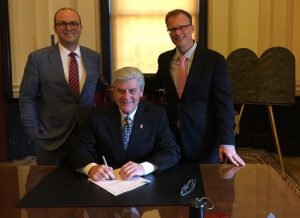Mississippi Center for Public Policy President & CEO Jon Pritchett announced today that Brett Kittredge has been named the new Director of Marketing & Communications for MCPP.
In this new position, Kittredge will oversee all media relations and marketing and communications needs for the office.
“We’re building not only a powerful policy and justice organization here, but also a media content shop where the leveraging of digital and traditional media is essential,” Jon said. “Brett has demonstrated that he has the strategic understanding and the tactical skills to allow us to communicate and market our ideas across the state and nation. We’re delighted to add another smart, dedicated conservative to our team.”
Kittredge previously served as Director of Communications for Empower Mississippi. Prior to that, he served in similar roles for the Mississippi Republican Party and the Office of the State Auditor.
“I am excited for this opportunity,” Brett said. “MCPP has a proud history of advancing the ideals of liberty and freedom in Mississippi, and I am ready to build on that legacy and take our communications platforms to the next level and spread our message of real conservative ideas with policy makers, the media, and the public.”
Kittredge received his Bachelor’s Degree from the University of Mississippi and his Master’s Degree from Abilene Christian University.
Today the U.S. Supreme Court ruled in favor of the plaintiff in an important First Amendment case, Minnesota Voters Alliance v. Mansky. Mississippi Justice Institute Director Shadrack White partnered with other organizations from around the country to file an amicus brief in the case in favor of the plaintiff.
“This is an important victory for freedom of speech today,” said White. “Conservatives and libertarians should be ecstatic over the recent rulings coming out of our Supreme Court. It was a privilege to be able to file an argument in this case supporting the winning side.”
The Mansky case challenged a Minnesota law that barred apparel that had ideological messages on it in polling places. MJI and other organizations argued that the Minnesota law violated the First Amendment.
“Minnesota tried to argue that this case was about protecting voters in the voting booth, but Minnesota’s law was being enforced in a way that favored some ideologies over others. For example, Minnesota admitted that they would ban shirts from a polling place that had the words ‘Don’t Tread on Me’ or the text of the Second Amendment or ‘All Lives Matter,’ but they would allow shirts with a rainbow flag or shirts that said ‘Parkland Strong.’
“That sort of inconsistent enforcement is exactly why we have the First Amendment: to protect the right of a person to speak even if the government happens to disagree with you or when someone says they’re offended by it,” said White. “You should not be punished for wearing a conservative or libertarian message. Americans should be thankful that this Court takes freedom of speech seriously.”
Click here to read the amicus brief from MJI and its sister organizations.
|
|
|
|
|
|
|
Victory for charter schools in Mississippi
Mississippi Justice Institute and other defendants protect constitutionality of charter schools according to trial court
(JACKSON) – Hinds County Chancery Judge Dewayne Thomas ruled today in the lawsuit challenging the constitutionality of charters schools in Mississippi. Judge Thomas ruled in favor of the charter schools and their parents, and against the Southern Poverty Law Center.
Mississippi Justice Institute (MJI) Director Shadrack White, who represents the parents of charter school students, said, “This is a critical victory for the parents and their children who attend charter schools in Mississippi. Judge Thomas saw that the constitution does not trap my clients in their traditional public schools when public charter schools provide a better option. These parents know what’s best for their children.”
The charter lawsuit turned on whether the Mississippi Constitution allowed funding from state and local governments to be spent at charter schools. “Our case was simple,” said White. “My clients pay taxes, so they should have the right to take that money to a public charter school if that is a better option for their children. These schools are making their lives better. The plaintiffs in this case, however, had an extreme argument: that the funding for charter schools, agricultural schools, some alternative schools, and other types of non-traditional public schools should be barred.”
“As this case marches forward, I am going to continue thinking about all the good that charter schools have done for my clients, like Gladys Overton and her daughter Drew,” said White. “When we started this case, Gladys told us that, in her old school, Drew experienced nonstop bullying and a difficult classroom environment. Drew moved to ReImagine Prep, a charter school in Jackson, and today she is thriving. She was the most improved student in her class last year and, like every other student at ReImagine, is learning computer coding skills to prepare her for the workforce.”
“Students like Drew are who we fight for,” added White.
####
Unanimous Mississippi Supreme Court Decides Columbus Mayor and Council Violated Open Meetings Act
Mississippi Justice Institute calls first-of-its-kind decision a monumental victory
for open and transparent government for all Mississippians
(JACKSON, MISS) – Today, the Mississippi Supreme Court ruled that the Mayor and City Council of Columbus violated the Open Meetings Act when they previously met in prearranged, non-quorum size gatherings to discuss public business, intending to circumvent the Act. This is the first time the Supreme Court has ever addressed the issue of whether meetings of public officials in less than quorum numbers violate the Open Meetings Act. The Mississippi Justice Institute represented The Commercial Dispatch in the appeal.
"This is a huge win for the citizens of Mississippi and for open and accountable government," said Mike Hurst, Director of the Mississippi Justice Institute. "People are tired of backroom deals and secret agreements by government officials that affect their lives. The Supreme Court's opinion puts public officials and bureaucrats on notice – you cannot circumvent the law and do the people's business behind closed doors anymore. Today's decision is a monumental victory for transparency in government."
In 2014, the Columbus mayor scheduled multiple meetings with council members to discuss policy issues and determine matters involving economic development projects and renovation of city property. The meetings were not announced or open to the public. At the time, the mayor excluded a Commercial Dispatch reporter from some of these meetings. In December 2014, the Mississippi Ethics Commission held that the mayor and council violated the Open Meetings Act. The mayor and city council appealed the decision to the Lowndes County Chancery Court, which upheld the Ethics Commission's decision. The mayor and city council then appealed to the Mississippi Supreme Court.
The original complaint against the Mayor and City Council was filed by Nathan Gregory, who at the time was a reporter for The Commercial Dispatch, a Columbus newspaper. The Commercial Dispatch eventually replaced Gregory as a party in the case. The Mississippi Justice Institute represented The Commercial Dispatch in the appeal.
The Mississippi Supreme Court ruled, "The four pairs of subquorum gatherings, along with the fact that they were prearranged, nonsocial, and on the topic of public business, illustrated the City's intent to circumvent or avoid the requirements of the Act. The philosophy and spirit of the Act prohibit the City from intending and attempting to circumvent or avoid the requirements of the Act. Additionally, the plain language of Section 25-41-1 requires the subject gatherings to be open to the public. Thus, the City's failure to hold open gatherings violated the Act."
In concluding, the Supreme Court noted that, "Prearranged, nonsocial gatherings on public business that are held in subquorum groups with the intent to circumvent the Act are required to be open to the public under Section 25-41-1 of the Open Meetings Act. Thus, the trial court correctly found that the City violated the Open Meetings Act."
Peter Imes, General Manager of The Commercial Dispatch said, "The public should have access to its government's decision-making process, and this ruling upholds that idea. It's a win for open government."
Hurst concluded, "Whether raising taxes, spending taxpayer money or issuing regulations that affect people's lives and property, people want to know what their government is doing. This decision clearly tells government officials to follow the law and do public business in the open."
The Mississippi Justice Institute is also representing a local Meridian man against the Lauderdale County Board of Supervisors who have committed the same violations of the Open Meetings Act as found illegal in the present case by the Supreme Court. See http://www.msjustice.org/case/lauderdale-open-meetings-act/
The Mississippi Justice Institute was assisted in this appeal by Clay B. Baldwin, Esq. of the Baldwin Law Firm PLLC in Madison, Miss.
The Mississippi Justice Institute is the legal arm of the Mississippi Center for Public Policy. It represents Mississippians whose state or federal Constitutional rights have been threatened by government actions. Mississippi Justice Institute is supported by voluntary, tax-deductible contributions. It receives no funds from government agencies for its operations. To learn more about MJI, visit www.msjustice.org.
--30--
|
|
|
U.S. Fifth Circuit Court of Appeals Reinstates Freedom of Conscience Law, HB 1523
Today, a three-judge panel of the Fifth Circuit Court of Appeals reinstated the “Protecting Freedom of Conscience from Government Discrimination Act,” more commonly known as HB 1523.
Passed by the Mississippi legislature in 2016, HB 1523 is intended to limit government action against people who believe marriage is a sacred relationship between a man and a woman. It provides protection for photographers, florists, and other wedding vendors who believe a wedding is a religious ceremony and that they shouldn’t be forced to participate in a ceremony that violates their deeply-help religious beliefs.
Today’s ruling did not address the merits of the law, including the question of its constitutionality. The ruling was limited to the question of whether the plaintiffs were qualified (known as “having standing”) to challenge the law in court. The Court said the plaintiffs did not have standing, because the law never went into effect and had caused them no injury except that they were offended by it. “Injury in fact,” not merely being offended by a law, is a prerequisite to having standing in federal court.
The court called the basis of the legal challenge “quite radical” because it would abandon long-held rules for standing which “are essential to preserving the separation of powers and limited judicial role mandated by the Constitution.” The Court also observed, “HB 1523 does nothing to compel the behavior of these plaintiffs; it only restricts the actions of state government officials.”
After HB 1523 was signed into law by Governor Bryant in April of 2016, it was ruled unconstitutional by U.S. District Judge Carlton Reeves on June 30, just minutes before it was to take effect. Attorney General Jim Hood refused to appeal that ruling, so Governor Bryant engaged pro bono counsel to represent him in appealing the decision.
Maine Governor Paul LePage and eight Republican attorneys general filed an amicus brief in support of the law. As they point out, “The law addresses marriage and does not even mention sexual orientation… HB 1523’s plain purpose is to protect individual rights to free expression and the free exercise of religion in our pluralistic society - a laudable goal that governments in this Nation have pursued since the Founding.”


